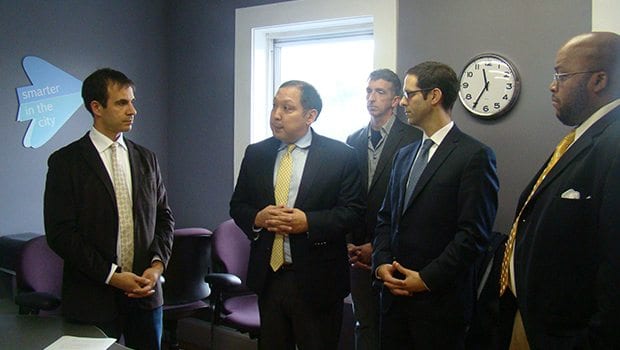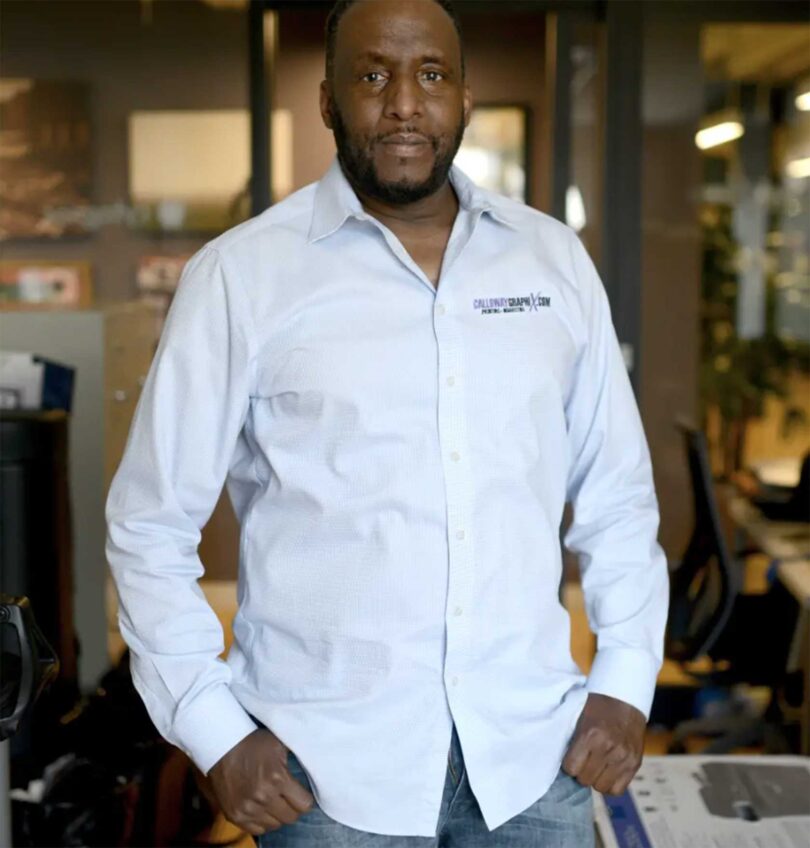
A number of federal, state and city officials visited Roxbury late last week to promote efforts to back the budding urban entrepreneurial community in Boston’s inner-city areas.

U.S. Small Business Administration New England Regional Administrator Seth Goodall talks with local entrepreneurs while visiting the office of Smarter in the City, a business incubator in Roxbury.
U.S. Small Business Administration New England Regional Administrator Seth Goodall, Massachusetts SBA District Director Bob Nelson and Massachusetts Assistant Secretary for Innovation Policy Eric Nakajima joined representatives from Boston’s Office of Business Development Oct. 23 at the business incubator Smarter in the City, and lauded the model the organization has put in place in Dudley Square. They also called for more government support of such business accelerator endeavors.
“It is just amazing to me what an organization like this will do in terms of connecting people and also helping grow communities and innovation,” said Goodall. “That is what these accelerators really are focused on — fostering an ethos and an environment that will help businesses grow and succeed.”
Smarter in the City is one of a number of business incubators that have popped up around the city recently, outside of the traditional Boston area innovation hubs such as Kendall Square or the Seaport District. Others include Start Up Lab and Fields Corner Business Lab.
Business incubators provide entrepreneurs with low-rent or sometimes no-rent small office spaces with shared amenities — printers, copy machines, kitchens, meeting rooms — keeping down costs, as well as providing access to startup services such as lawyers, consultants and investors.
Smarter in the City is considered one of Boston’s brightest, having just beat out over 800 applicants to become one of 50 business incubators to receive $50,000 from the SBA’s Growth Accelerator Fund.
The SBA fund backs business incubators and accelerators that will strengthen entrepreneurial ecosystems nationwide and fill the gaps in much needed capital for small businesses. The SBA gave special consideration to organizations that focus on underserved areas, women-owned startups, companies in the manufacturing sector and businesses headed by members of underrepresented groups.
Smarter in the City houses a handful of startup businesses by Roxbury, Dorchester and Mattapan entrepreneurs in its current location on Warren Street. These include: TrendON, PracticeGigs, Mbadika, KillerBoomBox and Tech Connection. The business incubator provides the startups with six months’ free workspace as well as a stipend.
“Entrepreneurship, innovation, accelerating the growth of our economy here in Massachusetts and insuring that there is broad participation in that growth is a key objective that Gov. Deval Patrick has,” said Nakajima. “The innovation economy is something that is not only the engine of prosperity in the Commonwealth, generally, but also specifically the destiny of entrepreneurs, individuals, communities throughout the Commonwealth, including throughout Boston.
“If you look at how our economy is growing here in the city, frankly, we need more places to participate in the innovation economy,” he added. “The reality is we simply need more parts of our city and our region to participate in the innovation economy so there are more places to grow.”
SBA’s Goodall is particularly encouraged by the growth of small business in Massachusetts, which he said is reflected by the fact that the state is tops in the U.S. for business loans under $150,000.
“Those are the loans that are really helping businesses start and grow. It’s not the $2-$3 million loans, it’s those smaller loans. And when you can help those dollars get into the hands of entrepreneurs, especially in underserved markets that really haven’t had the playing field leveled for them, this can make a huge difference — not only for them, not only for their employees, but for their communities,” he said.
According to Gilad Rosenzweig, founder and executive director of Smarter in the City, the $50,000 award from the Growth Accelerator Fund is an investment by the government into the business environment in Roxbury.
Though Boston has decades of success in startup development — particularly in high tech and biotech — Rosenzweig pointed out that in areas such as Roxbury, which he called outside of Boston’s tech clusters, there is still unemployment, low-wage employment and the need for businesses that can boost the neighborhood economy.
“It creates a problem where you are going to perpetuate income disparity and problems that we have in cities,” he said. “This is kind of a way of equalizing.”
He added, “It is not just coming into a city to do something in the community. It is also connecting communities and connecting neighborhoods in the city, and the idea that we can mashup Kendall Square and Dudley Square and find the important things and the best things in both. And companies in Smarter in the City have meetings in Kendall, and people from Kendall come down to Smarter in the City to have meetings — one day that is going to become the norm.”






